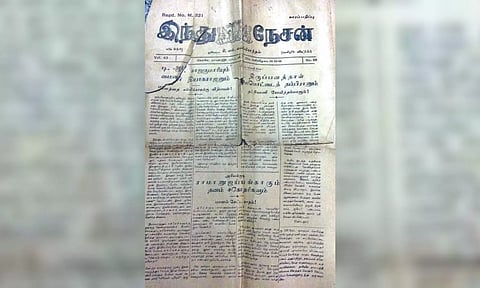

CHENNAI: The world of Madras in the 40’s was a playground of the rich and famous. Surprising, since there was a World War going on, and simultaneously, a scarcity of essentials — from rice (wheat was being advertised as greater food) to copper (anna coins were being melted clandestinely).
But it’s in times like these, that the cunning make hay. Stalwarts in the fields of cinema, music, politics, the arts and culture found themselves in the crosshairs of a blackmailer with a penchant for a quick buck.
Rumours always followed movie stars and the wealthy. Scandals cropped up everywhere, but they didn’t get much attention. A little effort was all it took to bag a few more juicy tidbits about their vices. And, a bit of courage to print them. Lakshmikanthan, who worked as a tout outside the Madras High Court had the guts.
His antecedents are hazy, but it is said that he may have served time in the Cellular Jail. He even boasted that he once almost escaped from the high security prison. A tout was a broker who stood at the entrance of the courts. When prospective clients walked in dazed at the turning of the wheels of justice, Lakshmikanthan would approach him and whisper the name of a great lawyer. The lawyer was more often than not an ‘out of job’ man who would then pay a commission out of the advance the client paid him to the tout.
Living a hand to mouth existence, Lakshmikanthan became privy to many rumours and found a way of monetising it. He figured that publicity was a must to turn these rumour mills into cash cows. And he dared to write about them in a newspaper of his own. He bought a defunct magazine Cinema Thoothu — one of the many hastily started with the boom in Tamil cinema. Whatever its earlier editorial policy was, the Thoothu now became a yellow rag. There was great readership and he had a set of fans calling him a crusader against moral corruption. A lawyer defending MK Thyagaraja Bhagavathar (MKT) in court would term Lakshmikanthan ‘The prince of yellow journalism.’
Some of Lakshmikanthan’s exposes were open articles that dropped names. Others carried subtle hints. From actors and actresses to industrialists, and even religious leaders, nobody escaped his pen. His modus operandi was simple. He would write a scurrilous article about someone and the feeler he sent out would earn him hush money. But not all succumbed. When his press was vandalised in revenge, Lakshmikanthan mentioned MKT among those responsible.
When those affected by the allegation complained to the British governor, Lakshmikanthan was summoned to court and fined Rs 300. Not to be defeated, he joined a rival paper Indu Nesan as editor and started slandering people again.
The rich and famous were willing to go to any levels to keep their secrets from being uncovered . On November 8, 1944, Lakshmikanthan took a rickshaw to visit a lawyer at General Collins Road in Vepery, when his vehicle was overturned by assailants. He was assaulted with a bichuwa (dagger) and a pen knife, which caused his innards to spill out. But the man that he was, he staggered to the Vepery police station and gave a statement. He was admitted at the general hospital, and operated on but died in the early hours of a day later.
“Lakshmikanthan is dead,” screamed the newspapers, and many heaved a sigh of relief. But surprisingly, half a dozen books mourning his death were immediately published.
Within 20 days, the police swooped on the reigning superstar MKT and top comedian NS Krishnan along with a host of others. The duo were accused of conspiracy to murder, and a jury trial convicted them and sentenced them to life. The film MKT had just acted in Haridas, would run in the theatres for almost three years till he was released.
The Madras jail was located just across a river and a road where Lakshmikanthan died, and the convicts were housed there. The superstars worked as bookbinders in prison. They sold all their assets and fought to the highest judicial levels for succour. The council in London whose doors they knocked said that with India set for independence, there was no case for delivering a verdict. At most, the council said they could ask the Madras High Court to reexamine the witnesses
Three years is a long time and the case had been too battered to face the onslaught of the best legal minds in the country. The accused were subsequently acquitted.
People never got to know the expose that finally did Lakshmikanthan in. But the episode had lasting effects on many. MKT could never attain a semblance of fame that he had before the murder. NS Krishnan reached a new peak in comedy but died early. Lakshmikanthan indeed had his revenge from the grave.